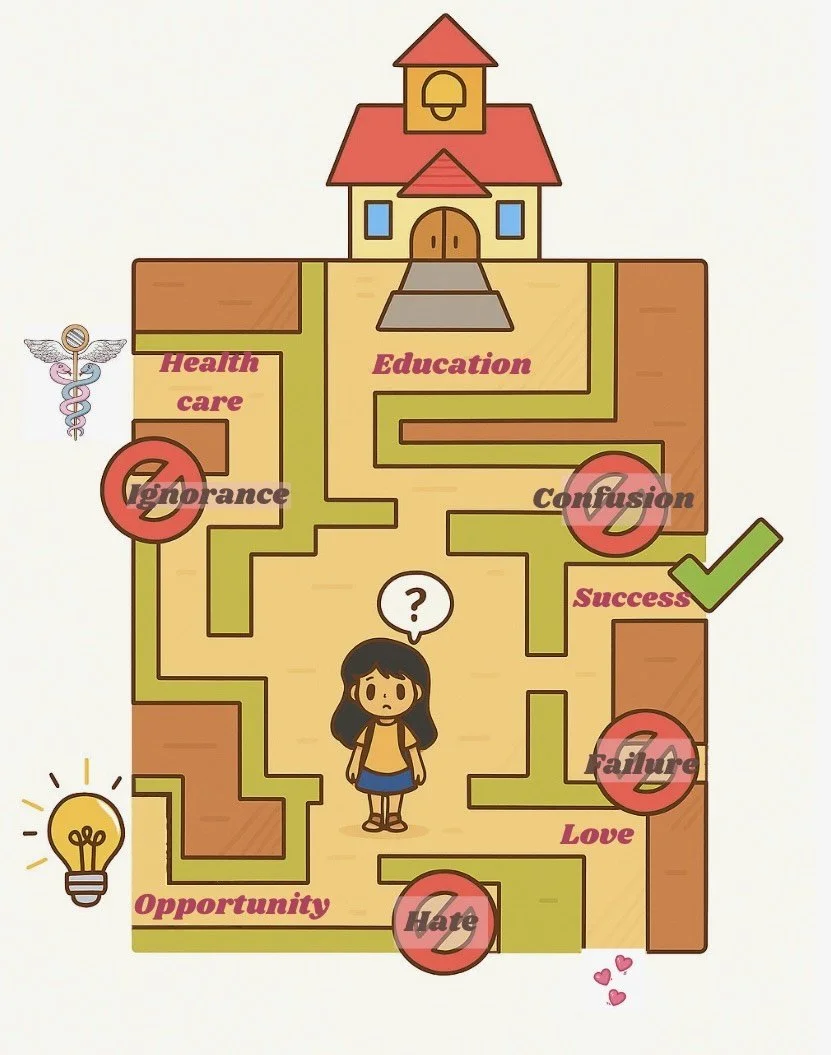Digital Directions
Article by: Samia Posadas / Graphic by: Adriel Malaca
The road to adulthood has always been uncertain, but for today’s teens, it is littered with digital detours. Headlines and viral content are increasingly replacing genuine knowledge. As students prepare for college and their first votes, they navigate the broad landscape of adult society with few reliable signs, often lacking the tools to separate fact from distortion.
To begin, the National Center for Education Statistics reports that limited resources leave gaps in student literacy, critical thinking, and exposure to diverse perspectives. Without these skills, students therefore struggle to evaluate evidence or analyze competing viewpoints, which are essential skills for making informed decisions about school and society. Additionally, the growing number of book bans and curriculum restrictions omits lessons on race, gender, and history. Education Week notes that this missing information leaves teens with a filtered reality, excluding the uncomfortable truths of today’s world. Censorship can create blind spots and gaps that are easily exploited by online misinformation, and these missing road signs make the journey to informed adulthood even riskier.
Meanwhile, social media steers teens toward emotional perplexion, not understanding. The American Economic Review underscores how platforms amplify sensational content, spreading misinformation without encouraging any level of critical evaluation. Pew Research Center finds teens spending hours online without the ability to discern accuracy. This negative influence is driving decisions while knowledge falls behind.
At this age, teens are deciding not only where to study and what paths to pursue, but also how to shape democracy. Without guidance, streams of information become a maze rather than a map. As this generation of teens will continue to define the course of society, they deserve clarity, justice, and especially, adequate knowledge to make choices worthy of the future they are inheriting. This responsibility falls on educators, leaders, communities, and the students themselves. By choosing knowledge over propaganda, questioning what is presented, and speaking up when truth is silenced, this generation can chart new directions for the next.
In all, the flow of time will inevitably keep moving, but the future does not need to be written by media algorithms. It must be shaped by an informed generation that thinks, questions, and most importantly, leads. The path ahead may be uncertain, but with the right tools, it does not have to remain blind.
Works Cited
Allcott, Hunt, et al. "The Welfare Effects of Social Media." American Economic Review, vol. 110, no. 3, 2020, pp. 629–676. American Economic Association, https://www.aeaweb.org/articles?id=10.1257/aer.20190658.
Anderson, Monica, Michelle Faverio, and Jeffrey Gottfried. Teens, Social Media and Technology 2023. Pew Research Center, 11 Dec. 2023, https://www.pewresearch.org/internet/2023/12/11/teens-social-media-and-technology-2023/.
Pendharkar, Eesha. "Challenges to Books in Public Schools Aren’t Slowing Down." Education Week, 6 Oct. 2023, https://www.edweek.org/teaching-learning/challenges-to-books-in-public-schools-arent-slowing-down/2023/10.
Center for Information & Research on Civic Learning and Engagement (CIRCLE). 2022 Election. Tufts University, 2022, https://circle.tufts.edu/latest-research/2022-election.
